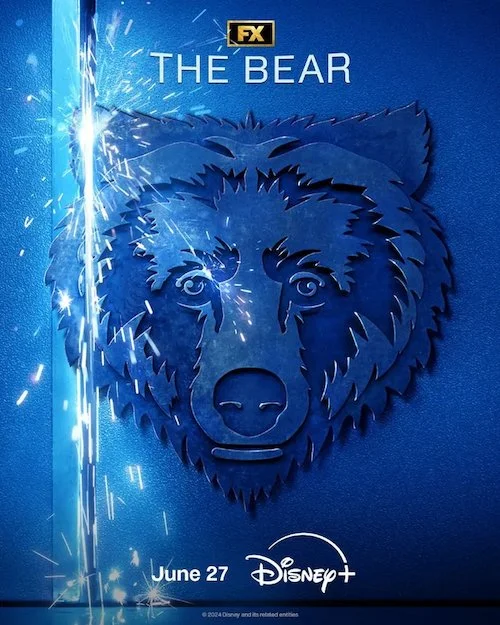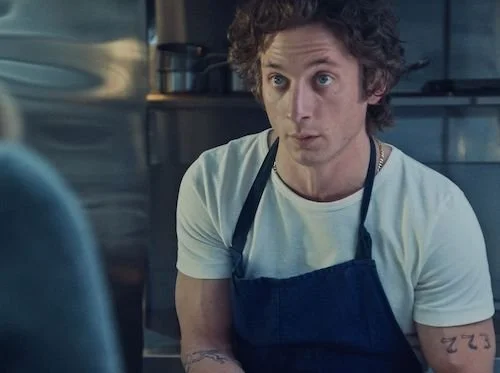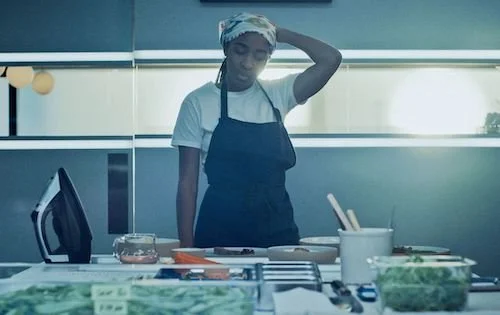The Bear Season 3: Binge, Fringe, or Singe?
Written by Andreas Babiolakis
Binge, Fringe, or Singe? is our television series that will cover the latest seasons, miniseries, and more. Binge is our recommendation to marathon the reviewed season. Fringe means it won’t be everyone’s favourite show, but is worth a try (maybe there are issues with it). Singe means to avoid the reviewed series at all costs.
Warning: Spoilers for Season 3 of The Bear will be present throughout this review. Reader discretion is advised.
The second season of Christopher Storer’s high octane culinary dramedy, The Bear, was a phenomenal highlight of last year’s television calendar. It slowed down the pacing of the first season to allow for temperatures to slowly rise back up to a boiling point again. We got to learn more about the characters and how much their workplace means to them (in terms of how desperately everyone needs this restaurant to succeed). The season toyed with timing — constantly reminding us that every second counts — to the point of leaving us at the edge of our seats, wondering what will happen with Carmy’s (Jeremy Allen White) quest to turn his late brother’s beef sandwich shop into a fine dining super spot. The season ended with the open of The Bear: a new restaurant that would elevate the Chicago dining scene (and those working within the establishment) to a whole new level. At least that’s what Carmy wants. The first night was a triumph, and yet Carmy ruined things for himself. He placed a wedge between himself and Richie (Carmy’s late brother’s best friend, who manages the restaurant and represents the front of house staff, played by Ebon Moss-Bachrach), and completely obliterated his relationship with Claire. We were left wondering what was salvageable.
The third season of The Bear is finally here after FX jettisoned all ten episodes at once. The series has never been more committed to taking risks, taking its time, and developing its characters. Despite all of this, as strong as I find this third season, The Bear seems to have lost its knack for knowing when exactly to pull proteins out of their heat sources, when to plate dishes, and have them served before even a hint of coldness approaches the meal. I wouldn’t dare call the third season of The Bear a bad or mediocre one, but it may be trying a bit too hard to perfect its recipes when it had the secret formula down to a fine art last year. For a show that everyone on board knows will be released all at once, The Bear’s third season doesn’t perform as nicely in one binge watched sitting (not like the previous seasons, anyway) and it may be best to digest each episode slowly. There’s a lot to get through, much to unpack, and a demand for you to really take your time with each episode. You’ll appreciate The Bear’s third season far less if you don’t.
As everything has been brought up to the highest setting, that includes the gambles taken as well, and The Bear kicks this season off with one of its most glorious episodes to date: “Tomorrow”. Two minutes in, you may be wondering where this introduction is going, as it weaves in and out of different timelines in Carmy’s life as a cook, chef, and food enthusiast (with no clear chronology whatsoever). Five minutes later, you’ll be wondering if your eyes and ears are deceiving you. That brief reprieve of the black dead card that brings us to the commercial break occurs, and the return back to The Bear is when you finally realize that this entire episode feels this way. Essentially, “Tomorrow” is a tapestry of memories, the present, and Carmy’s greatest anxieties and depressions within the culinary industry. It is skewered by the damnation of damaging criticism, nurtured by droning, ambient music, and garnished with Carmy’s realizations of what he did wrong in the Season 2 finale. Is this his swirling head while he is trapped inside of the walk-in fridge? We don’t get a clear answer as much as we receive a sublime, daring episode that continuously misdirects us (for example, Sydney makes a phone call which seems to be with Carmy until it’s revealed that it’s in fact for Marcus (Lionel Boyce), whose mother has just died in hospital) and sets us up for the current season. It is as daring as television can get in 2024.
While a bit too varnished, the third season of The Bear possesses strong character development and story structure, intended to sustain the series for at least one more season.
The next episode, appropriately titled “Next”, is the first traditional episode of the season. Sydney (Ayo Edebiri) is clearly tired of living at home with her father despite how much she loves him, and her irritation continues in the kitchen during the umpteenth squabble between Carmy and Richie (the first since the opening night fiasco). There is some good news present as well once Carmy is able to deliver them: he is offering Sydney a partnership agreement to own stake in The Bear. It’s the kind of elevation Sydney needs and deserves. As the third season continues, her capabilities are noticed by others outside of The Bear, as she is offered a highly promising position at a developing restaurant nearby that may leave her in an even better position. What Sydney also doesn’t know is just how much trouble The Bear is in. Cicero (Oliver Platt), who invested an unfathomable amount of money into the restaurant, is flabbergasted by how much profit the restaurant is blazing through. Everyone is aware that the restaurant has to perform well as to not reach bankruptcy, but we learn towards the end of the season that Cicero is withholding just how bad the state of the restaurant presently is: it’ll be forced to close, like many others, any day now.
Part of these struggles come from Carmy’s list of non-negotiables: demands as to how the restaurant must operate every day. This includes a rotating menu of fine dining delicacies, which is hurting their profits greatly. Carmy’s mission is to turn The Bear into a Michelin Star restaurant, and he molds his ways via those who instructed him before (even if they were abusive to him). He knows what goes into an award winning restaurant. He also doesn’t know how to stop generational dysfunction and abuse. No one in his family does. His sister Natalie (Abby Elliott) is sure trying to. She is pregnant for most of the season and finally delivers her newborn in “Ice Chips” (food that is anything but fine or delicious, but is as nurturing to the soul and body as anything else is). Throughout this standout episode, Natalie desires bringing her child into a world of calmness and stability; in doing so, she learns to get along with her estranged, mentally unstable mother (played by Jamie Lee Curtis, who is somehow even better here than she was in last year’s episode “Fishes”).
A pivotal episode is the third entry, “Doors”: a nerve-wracking insight as to what the first month of operations look like for the restaurant. Edited more frantically than ever before, we see the plethora of mistakes that occur, the dollars that get wasted by broken dishes and glasses, and the tensions flare up more than ever before. This is an essential episode to understand the calamity of the workplace for everyone, and the very thin margins that any dining establishment operates on in the real world. All of this comes after Marcus’ mother’s funeral: a reminder that life goes on, and we cannot stop what comes to us. It’s essential given the overall theme of the season; if last year was obsessed with reminding us that every second in the kitchen counts, then this third season drives home the point that it is crucial that we spend time with those we love. Like Carmy, Marcus was working when his loved one passed, and both men will never get these opportunities to be with their favourite people in their final hours.
It is right afterwards in the vulnerable, candid episode, “Violet”, that we zero in on the private conversations main characters have within their lives outside of The Bear. It is a glacial episode that works well, as you feel like you are a part of these peoples’ existences, and not once is anyone yelling or getting riled up. In fact, almost everybody feels beautiful here. They are uniquely themselves. It is the culinary environment and the threat of poverty that brings everyone to their stressful states. They get time to mellow out in “Violet”. I wish this was the only episode that felt this personal (while it is the most stripped down, there are other episodes with hints of these kinds of scenes) because the heavy usage of slowness in other episodes holds this third season back from being as exhilarating as it could be; it’s okay to spend time with these lovely characters and allow them to grow, but this season goes about this focus a bit too frequently.
The Bear’s awareness of the current state of the world helps it become an even more relatable show to its viewers.
To understand my point a bit better, let’s focus on what may be the second best episode next to “Tomorrow”, “Napkins”. Marcus and Richie got their own stand alone episodes last year, and now it’s time for the criminally underrepresented Tina (Liza Colón-Zayas) who gets a flashback story of her own. If you wondered why she was so bitter to Sydney at the start of the series, we now know why as we watch a hard working wife get sent back to square one after a punishing, unforeseen layoff. As she fights to find a new job, her enthusiasm wanes after her realization of how different career spaces are. She has to submit resumes online and not in person. She is combating against hundreds of applicants. Despite her many years of experience, her not having a bachelor’s degree stifles her chances of getting hired. She’s not even being treated like a human being at times. Her displacement from how the market currently is (given how different times were when she was younger and applying) is a startling reminder for us all.
It’s also pertinent as to understand a major theme of this season: the decline of the fine restaurant industry, and civilization as a whole (as we all fight to find jobs and unemployment skyrockets). We get the whopping news that Chef Terry (Olivia Colman) is forced to close her restaurant, Ever, and this only scares Carmy even more: if a master of her craft and establishment has to call it a day, what about someone who cannot get it together like himself? As we learn more about everyone’s predicaments, the importance of The Bear’s success is enforced. A triumphant sequence midway through the series involves the possibility that Marcus is too expensive to keep on board, with Natalie refusing to lay him off (especially after his recent loss). We can view each major and minor character in this light. What would happen if The Bear closes? Natalie’s family now suffers right after her child was born. Sydney may be forced to take that offer up. Richie may struggle to be in his daughter’s life, and he may feel like he failed his late best friend. Tina may never find that next job. We could keep going, but you get the idea. Outside of the positive in Sydney’s predicament, everyone else suffers.
While The Bear undermines itself in Season 3, it appears to strengthen the previous episodes while setting up for what is to come (Season 4 is already confirmed, even before these ten recent episodes were released). The reintroduction of many of the previous cameos the series had (from Joel McHale and Olivia Colman, to Will Poulter and Jamie Lee Curtis) makes their previous blips feel much more essential to the overall story of The Bear: no longer are they famous faces that came and went for the hell of it. With that in mind, the cameos this season feel a lot weaker not due to bad performances but because of the flimsier purposes they serve. Josh Hartnett is quite great as Frank, the soon-to-be stepfather to Richie’s daughter, but his time on screen is too brief and not important enough to warrant such an appearance. Then there’s John Cena (the third of the Fak brothers) who is just plain goofy; while he is actually quite funny to watch, his appearance in the show feels quite out of place and unnecessary. These actors fulfilled their obligations; it is the forcing-in of these characters that is the problem. The second season’s cameos all felt warranted. These don’t. Outside of the occasional pacing issues, this is my chief complaint of what is a mainly strong season.
Nonetheless, as I was saying, this third season is clearly focused on adding to what came before it and what is to arrive next year. While that hinders what we do get a little bit, I feel like this will help in the long run. With that in mind, I don’t think that the third season needed to sacrifice anything in order to accomplish its directives. Is a majority of what we get not terrific? Could we not cut off a bit of the extra story that doesn’t feel critical? I feel like Storer and company were trying a bit too hard to go the extra mile when the very first episode reinforces the mantra that Chef Fields (McHale) maligns Carmy with: less is more. You add by subtraction. Some of these moments are a little too drenched in sauce or have been cooked for a hair too long. Otherwise, most of what we get is just right, so it’s easy to dismiss the occasional lulls.
Most of the gambles pay off as well. “Tomorrow” is a sensational episode that most series wouldn’t even dream of pulling off (and I’m flabbergasted as to how Storer and company do land on both feet here). Edebiri can now call herself the director of the phenomenal cut “Napkins” (maybe she should do even more directing, either for The Bear or for other high profile projects, because she’s clearly great at it). “Doors” possesses all of the anxiety of a whole season in a mere half hour runtime without ever feeling tiresome or bloated. The two-woman show between Elliott and Curtis in “Ice Chips” is a masterclass in acting and dialogue writing. Sure, we do have episodes that could afford to be fine tuned like “Children” and even the finale “Forever”, but no episode here is outright skippable or anything less than good. I can only hope that these aren’t warning signs of even more flaws that are to come, because The Bear is clearly not out of ideas or creativity; it just needs to learn, like Carmy, to realize when it has something great right in front of it as to not go overboard and in the wrong direction.
Andreas Babiolakis has a Masters degree in Film and Photography Preservation and Collections Management from Ryerson University, as well as a Bachelors degree in Cinema Studies from York University. His favourite times of year are the Criterion Collection flash sales and the annual Toronto International Film Festival.






